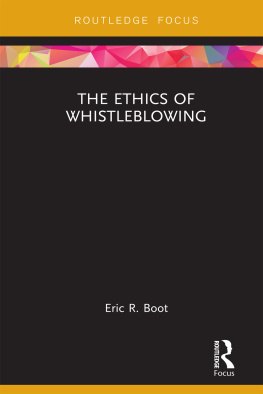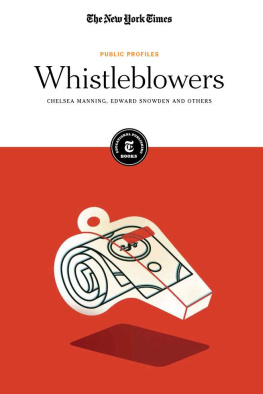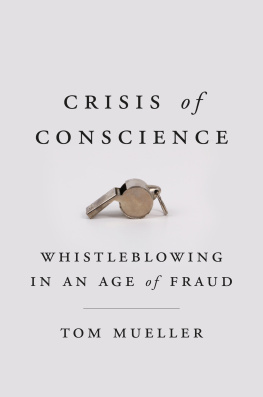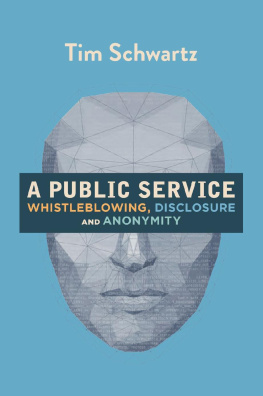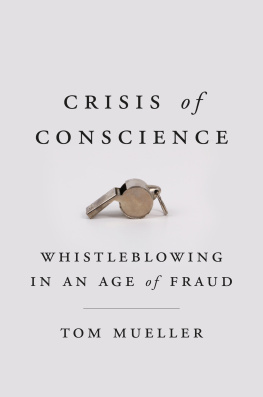The Ethics of Whistleblowing
Following the enormous political, legal, and media interest that has surrounded high profile cases of whistleblowing, such as Chelsea Manning and Edward Snowden, the fundamental ethical questions surrounding whistleblowing have often been obscured. In this fascinating book, Eric Boot examines the ethical issues at stake in whistleblowing.
Can the disclosure of classified government documents ever be justified? If so, how? Why does it require justification in the first place? Can there ever be a duty to blow the whistle? When is breaking the law justified?
On a more practical level, this book also considers the various whistleblower protection documents and finds them often lacking in consistency and clarity, before providing an argument for a plausible public interest defense for whistleblowers.
Eric R. Boot is a Lecturer at Utrecht University, The Netherlands. He is also the author of Human Duties and the Limits of Human Rights Discourse (2017).
Routledge Focus on Philosophy
Routledge Focus on Philosophy is an exciting and innovative new series, capturing and disseminating some of the best and most exciting new research in philosophy in short book form. Peer reviewed and, at a maximum of fifty thousand words, shorter than the typical research monograph, Routledge Focus on Philosophy titles are available in both ebook and print-on-demand format. Tackling big topics in a digestible format the series opens up important philosophical research for a wider audience, and as such is invaluable reading for the scholar, researcher and student seeking to keep their finger on the pulse of the discipline. The series also reflects the growing interdisciplinarity within philosophy and will be of interest to those in related disciplines across the humanities and social sciences.
Delusions and Beliefs
A Philosophical Inquiry
Kengo Miyazono
milie Du Chtelet and the Foundations of Physical Science
Katherine Brading
Extended Consciousness and Predictive Processing
A Third Wave View
Michael D. Kirchhoff and Julian Kiverstein
What We Ought and What We Can
Alex King
The Ethics of Whistleblowing
Eric R. Boot
For more information about this series, please visit: www.routledge.com/Routledge-Focus-on-Philosophy/book-series/RFP
The Ethics of Whistleblowing
Eric R. Boot

First published 2019
by Routledge
2 Park Square, Milton Park, Abingdon, Oxon OX14 4RN
and by Routledge
52 Vanderbilt Avenue, New York, NY 10017
Routledge is an imprint of the Taylor & Francis Group, an informa business
2019 Eric R. Boot
The right of Eric R. Boot to be identified as author of this work has been asserted by him in accordance with sections 77 and 78 of the Copyright, Designs and Patents Act 1988.
All rights reserved. No part of this book may be reprinted or reproduced or utilized in any form or by any electronic, mechanical, or other means, now known or hereafter invented, including photocopying and recording, or in any information storage or retrieval system, without permission in writing from the publishers.
Trademark notice : Product or corporate names may be trademarks or registered trademarks, and are used only for identification and explanation without intent to infringe.
British Library Cataloguing-in-Publication Data
A catalogue record for this book is available from the British Library
Library of Congress Cataloging-in-Publication Data
Names: Boot, Eric R., 1984- author.
Title: The ethics of whistleblowing/Eric R. Boot.
Description: Abingdon, Oxon; New York: Routledge, 2019. |
Series: Routledge focus on philosophy | Includes bibliographical references and index.
Identifiers: LCCN 2019007549 | ISBN 9781138343696 (hardback: alk. paper) | ISBN 9780429439001 (e-book)
Subjects: LCSH: Public policy (Law)Philosophy. | Whistle blowingLaw and legislationPhilosophy. | Whistle blowingMoral and ethical aspects.
Classification: LCC K378 .B66 2019 | DDC 172/.1dc23
LC record available at https://lccn.loc.gov/2019007549
ISBN: 978-1-138-34369-6 (hbk)
ISBN: 978-0-429-43900-1 (ebk)
Typeset in Times New Roman
by Deanta Global Publishing Services, Chennai, India
Contents
The research for this book was done in the context of the research project Unauthorized Disclosures, which was part of the ERC-funded project Democratic Secrecy: A Philosophical Analysis of the Role of Secrecy in Democratic Governance, led by Dorota Mokrosinska. So I would like to thank her, first of all, for the opportunity to spend several years thinking about the various ethical issues surrounding whistleblowing. I would like to thank as well my wonderful former colleagues at Leiden University for their helpful feedback and insights that, at one point or another, helped me order my thoughts and improve my writings. Furthermore, the various papers that this book is based on have been presented at numerous conferences in sundry forms. The helpful feedback I received there has been of tremendous importance in realizing the present work. In particular, I would like to thank Michele Bocchiola, Kimberley Brownlee, Jonathan Bruno, Simon Caney, Emanuela Ceva, Candice Delmas, Axel Gosseries, Manohar Kumar, Rahul Sagar, Will Smith, and Daniele Santoro. I hope my treatment of their remarks, concerns, and suggestions has done them justice and that the final result is the better for it.
In the final months before submitting the entire manuscript, I had the opportunity to enjoy a research stay at the UC Berkeley School of Law. This provided me both with the necessary time to finish the book and with the pleasure of discussing my work with Chris Kutz, whose helpful comments have certainly improved the work.
Finally, my profound gratitude goes out to my family my wife Pina and my children Eleonora and Federico simply for being there.
Let us start with a case most readers will likely be familiar with: Edward Snowdens disclosures regarding the National Security Agencys (NSA) mass surveillance programs. Briefly discussing this case will allow me to introduce the general theme of this book, present some of its main questions, and clarify what the unique focus of the present work on whistleblowing is. Snowden downloaded and then passed on to journalists for The Guardian and The Washington Post (the former of which later enlisted the help of journalists for ProPublica and The New York Times ) approximately 1.7 million U.S. government classified documents.).
On the other hand, some have pointed out that Snowdens disclosures have hampered the functioning of certain NSA programs that have actually played a role in preventing terrorist attacks. The Presidents Review Group on Intelligence and Communications Technologies concluded, for example, that Section 702 of the Foreign Intelligence Surveillance Act allowing the U.S. intelligence community to target the communications of non-U.S. persons residing outside the United States for foreign intelligence purposes has played a role in gathering the intelligence that led to over 50 counterterrorism investigations. The Presidents Review Group is convinced that Section 702 does in fact play an important role in the nations effort to prevent terrorist attacks across the globe. Still, it remains an open question whether the success that (some of) the NSAs surveillance programs have had outweighs the costs to privacy.
Others have criticized Snowden for the unilateral manner in which he acted. As Seana Shiffrin put it, his disclosures did not merely amount to a political critique of the NSAs surveillance programs but were instead political speech acts. In other words, his disclosures did not merely constitute a criticism of particular policies, but rather they amounted to a unilateral political decision . Unauthorized disclosures such as Snowdens immediately, performatively as it were, undo the decision (made by democratically elected officials) to keep a certain piece of information secret. But who is this Booz Allen Hamilton contractor to decide for millions of Americans what ought to be public and what may remain secret? Is that not the task of our representatives in government?

